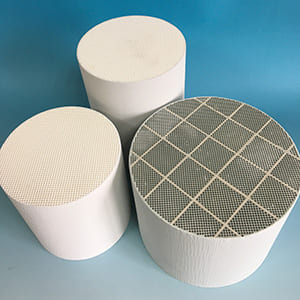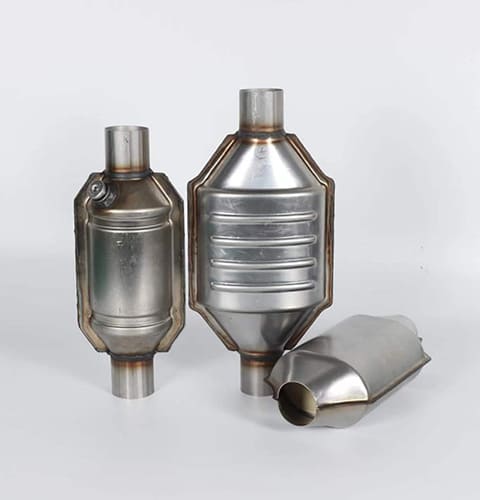Did you ever blankly stare at your mechanic as he explains to you that you need to have a DPF replacement? Perhaps he mentioned terms like “cordierite” and “silicon carbide” and you responded with nods, still not having a clue about what he meant. As emissions standards worldwide start getting tougher, these diesel particulate filters became crucial components in the diesel engines of today. But with so many varying opinions about the Internet, how do you decide what material is actually better for your own use? Are you wasting more money on a highly priced type, or even worse, compromising on an incompatible filter that will not last?
Among DPF materials, neither silicon carbide nor cordierite is ever “better” – each is best in some applications. Cordierite DPFs offer approximately 30-40% lower cost, 20-25% lower weight, and excellent thermal shock resistance, well suited for most passenger car and light commercial applications. Silicon carbide DPFs are longer lasting at 2-3 times higher mechanical strength, higher heat resistance (2200°C vs 1200°C maximum for cordierite), and marginally higher filtration efficiency (99%+ vs 95-98%). Your best option depends on specific vehicle requirements, driving style, and budgetary consideration rather than one material being inherently better.
Wondering which material might be right for your specific situation? The following sections break down the detailed differences, performance characteristics and ideal applications for each material. Understanding these nuances could save you thousands in unnecessary repairs, while optimising your vehicle’s performance and emissions control.
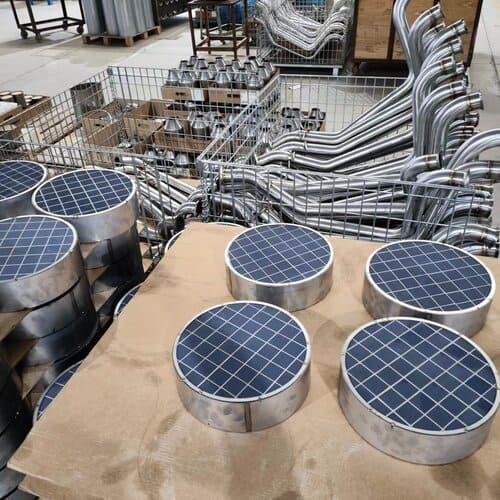
What Are The Key Physical Properties Of Cordierite And Silicon Carbide DPFs?
Cordierite (chemical composition 2MgO-2Al₂O₃-5SiO₂) is a synthetic ceramic material with a unique honeycomb structure. This material has become popular in DPF applications due to its excellent thermal expansion properties.
Studies from the International Journal of Applied Ceramic Technology show that cordierite’s low thermal expansion coefficient (about 1-2 × 10⁻⁶/°C) gives it outstanding thermal shock resistance. This means it can withstand rapid temperature fluctuations without cracking.
The porosity of cordierite typically ranges between 45-50%, creating sufficient surface area for particulate capture while maintaining acceptable backpressure levels.
In contrast, silicon carbide (SiC) offers different physical characteristics. Research published in the Journal of the European Ceramic Society demonstrates its superior heat resistance, withstanding temperatures up to 2200°C without structural deterioration.
SiC possesses higher thermal conductivity (approximately 120 W/m·K compared to cordierite’s 2-3 W/m·K), allowing more uniform heat distribution during regeneration cycles.
The wall thickness in SiC filters can be manufactured thinner (200-300 micrometers versus cordierite’s 300-400 micrometers) while maintaining structural integrity, reducing exhaust backpressure.
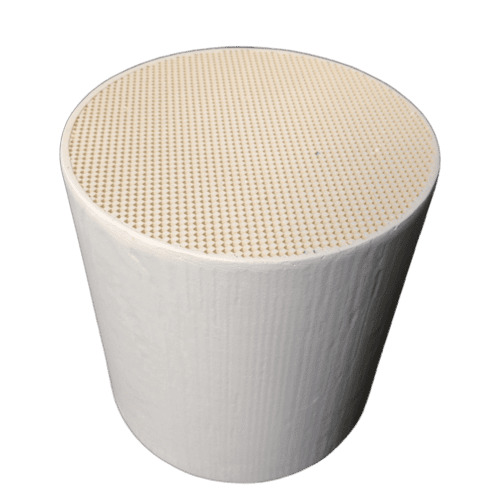
How Do These Materials Perform Under Real-World Driving Conditions?
Under typical driving conditions, cordierite DPFs provide reliable performance for passenger cars and light commercial vehicles.
According to SAE International technical papers, cordierite filters achieve particulate matter capture rates between 95-98% for most standard driving cycles.
Their lower thermal mass means faster light-off during cold starts, potentially improving fuel efficiency during short trips.
However, cordierite shows limitations under extreme conditions. At temperatures above 1200°C, these filters risk melting damage that can lead to complete failure.
Silicon carbide filters demonstrate different performance characteristics. Testing from the Emission Analytics organization shows they maintain structural integrity even under severe regeneration events.
Their higher filtration efficiency (typically 99%+) makes them particularly valuable for meeting stringent emission standards like Euro 6d and beyond.
The superior thermal stability of SiC provides extended safety margins during active regeneration, when trapped particulates burn off at temperatures between 550-650°C.
When you’re driving aggressively and putting a lot of stress on it, SiC’s durability really shines through, because it’s way less likely to melt or crack.
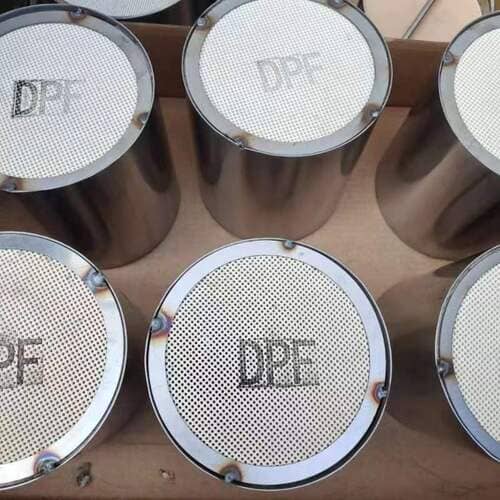
What Cost Factors Should Influence Your DPF Material Choice?
The initial purchase price represents a significant difference between these materials. Cordierite filters for passenger vehicles typically cost between $300-800, while comparable silicon carbide options range from $500-1,200.
This approximately 30-40% price differential makes cordierite attractive for budget-conscious consumers and fleet operators managing multiple vehicles.
However, total cost of ownership calculations must consider replacement frequency. Data from DieselNet indicates silicon carbide’s longer lifespan may offset its higher initial cost for high-mileage applications.
Installation labor costs remain similar between materials (typically $300-600), meaning material price differences directly impact the total replacement expense.
Cleaning and maintenance requirements also affect long-term economics. Both materials require periodic cleaning to remove accumulated ash, with professional services charging $300-500 regardless of material type.
For commercial fleets, the downtime costs associated with more frequent cordierite replacements may outweigh initial savings, particularly for vehicles that operate continuously in revenue service.
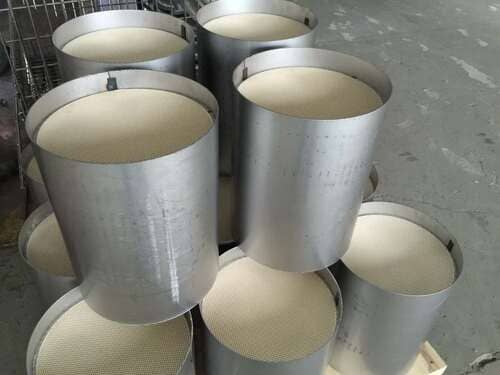
Which Vehicles Benefit Most From Each DPF Material Type?
Passenger cars and SUVs with intermittent use patterns typically benefit from cordierite DPFs. These vehicles rarely reach extreme operating temperatures and the lower cost aligns with consumer expectations in this segment.
According to Automotive World market analysis, over 70% of original equipment manufacturers use cordierite for standard passenger applications.
Light commercial vehicles with moderate duty cycles also perform adequately with cordierite filters, especially when regular maintenance schedules are followed.
In contrast, heavy-duty trucking applications generally demand silicon carbide filters. Research from the American Transportation Research Institute demonstrates their superior durability under continuous high-load conditions.
Construction and mining equipment operating in severe environments show significantly extended service intervals with silicon carbide filters, despite their higher initial cost.
Agricultural machinery presents unique challenges due to variable load conditions and dusty environments. The higher ash accumulation capacity of SiC filters makes them advantageous in these applications.
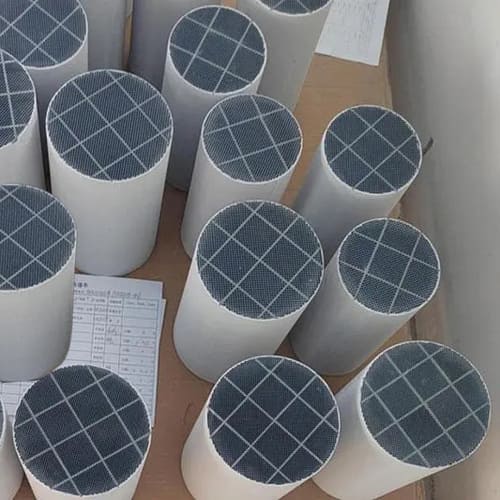
How Do Environmental Factors Affect DPF Material Performance?
Different climate conditions can significantly impact DPF performance and material suitability.
In cold regions, cordierite’s lower thermal conductivity can increase the time needed to reach operating temperatures. This may extend the duration of higher emissions during cold starts.
High-temperature environments generally favor silicon carbide, as its superior heat resistance provides additional safety margins during operation in hot climates.
The altitude at which vehicles operate also matters. At higher elevations, where engines may run richer to compensate for lower oxygen levels, silicon carbide’s higher soot oxidation capacity becomes advantageous.
Air quality regulations in different regions may influence material selection. Areas with stricter particulate emission standards may justify the additional cost of silicon carbide’s higher filtration efficiency.
According to the International Council on Clean Transportation, silicon carbide filters show particular advantages in meeting ultra-low emission requirements in densely populated urban areas.
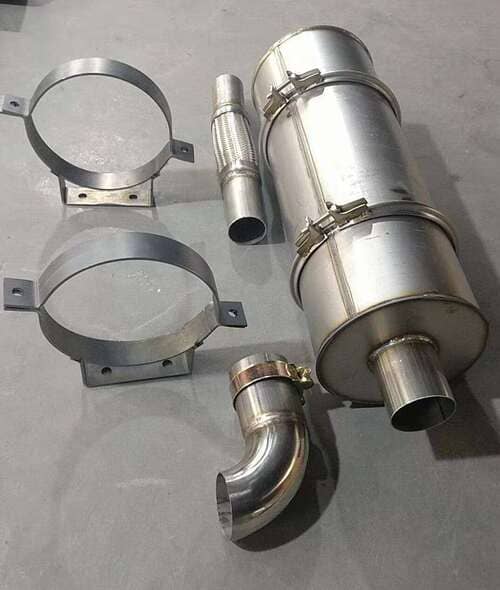
Conclusion
When it comes to cordierite and silicon carbide DPFs, there’s no one “better” option — it’s all about finding the right material for your specific needs. Cordierite’s got some major cost benefits, solid performance, and enough durability for most regular cars. Silicon carbide is better for heavy-duty and demanding applications because it’s longer-lasting, more temperature resistant, and more efficient at filtering out dust and other particles. The best choice depends on balancing the initial cost against how you’ll use it, the driving conditions, and long-term maintenance. If you understand these differences, you can make an informed decision that controls emissions and keeps ownership costs down for your particular diesel vehicle.

